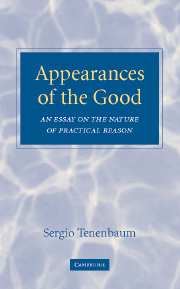Book contents
- Frontmatter
- Contents
- Acknowledgments
- Appearances of the Good
- Introduction
- 1 The Basic Framework: Desires as Appearances
- 2 The Basic Framework: From Desire to Value and Action
- 3 The Subjective Nature of Practical Reason
- 4 The Objective Nature of Practical Reason
- 5 Deontological Goods
- 6 Motivation without Evaluation? Unintelligible Ends, Animal Behavior, and Diabolical Wills
- 7 Evaluation and Motivation Part Company? The Problem of Akrasia
- 8 Evaluation without Motivation? The Problem of Accidie
- Bibliography
- Index
7 - Evaluation and Motivation Part Company? The Problem of Akrasia
Published online by Cambridge University Press: 25 August 2009
- Frontmatter
- Contents
- Acknowledgments
- Appearances of the Good
- Introduction
- 1 The Basic Framework: Desires as Appearances
- 2 The Basic Framework: From Desire to Value and Action
- 3 The Subjective Nature of Practical Reason
- 4 The Objective Nature of Practical Reason
- 5 Deontological Goods
- 6 Motivation without Evaluation? Unintelligible Ends, Animal Behavior, and Diabolical Wills
- 7 Evaluation and Motivation Part Company? The Problem of Akrasia
- 8 Evaluation without Motivation? The Problem of Accidie
- Bibliography
- Index
Summary
The scholastic identification of desiring and conceiving to be good, of motivational and evaluative attitudes, faces a challenge from cases of akrasia. In cases of akrasia, agents are not motivated in accordance with comparative evaluations. An akratic agent will think that A is better than B yet pursue B. In these cases, the agent's motivational states seem not to fall in line with his evaluative states.
It is not completely uncontroversial that accidie and akrasia are indeed possible, at least if described as cases in which the agent's motivation does not correspond with his evaluative judgments. However, denying this possibility seems like denying the phenomena; we at least seem to confront instances of these kinds of behavior often enough. The existence of phenomena that correspond to these descriptions of akrasia seems to be a major argument against the scholastic view in the context of intentional explanations and in favor of separatist views, views that allow motivation and evaluation to come completely apart. The aim of this chapter is to show not only that the scholastic view has the right tools to account for akrasia but also that it accounts for the phenomena better than separatist views.
THE PROBLEM WITH AKRASIA
In the Protagoras, Socrates says that most people
maintain that there are many who recognize the best but are unwilling to act on it.… Whenever I ask what can be the reason for this, they answer that those who act in this way are overcome by pleasure or pain.
Information
- Type
- Chapter
- Information
- Appearances of the GoodAn Essay on the Nature of Practical Reason, pp. 257 - 282Publisher: Cambridge University PressPrint publication year: 2007
